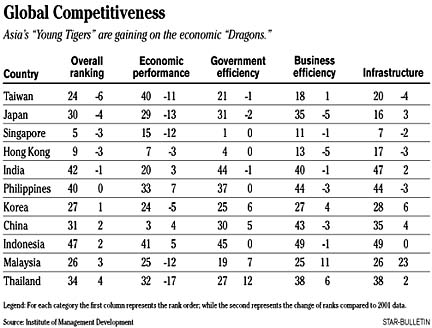

![]()
Pacific Perspective


![]()
Pacific Perspective
Asia’s retreat on scale
of world competitiveness
can be misleadingThe Institute for Management Development in Lausanne, Switzerland, has released its well-publicized annual ranking of 49 nations with regard to their ability to compete in the global marketplace. The United States retains its strong leadership position significantly ahead of Finland, which is now the second best.
The overall scoreboard is based on economic performance, business and government efficiency, and national infrastructure.
What is noticeable in the 2002 ranking (based on 2001 data) is that the "Asian Dragons" - Taiwan, Japan, Singapore, and Hong Kong - have fallen quite a bit in their relative standing during the past year. Conversely, the "Young Tigers" - China, Indonesia, Malaysia and Thailand - have gained a couple of ranks.
At first sight, this drop in ranking in the more established economies seems logical when one appreciates the severe problems Japan is experiencing and the impacts of a sluggish economy on Taiwan, Singapore and Hong Kong. Also, with other comparable countries at the tail end not performing well (for example Eastern Europe and South America), someone's loss is bound to be someone else's gain.

However, attempting to judge the ability of a country to perform in a global market based on the composite raking - either for investment or competition analysis purposes - can be deceiving. In fact, the poor economic performance of Japan, Hong Kong and Taiwan last year was much worse than the few positions they lost in the world ranking would indicate, especially since Thailand and Malaysia faced similar circumstances. The global economic slowdown was worsened by the tragic events of Sept. 11. And 2001 is a year that remains difficult to quantify and determine the drivers of competitiveness or un-competitiveness.On the other hand, if there is some truth that should be derived from the rather confusing set of economic data gathered in 2001, one should look at the future potential of the country candidates. One should acknowledge the significant improvement of the economic and technological infrastructures of Korea, Malaysia, China, and even Japan, as well as the positive impacts of a sound fiscal policy and responsible public finance in Singapore, Thailand, Malaysia and China.
If 2001 is a year to forget, there are good reasons to hope the countries in Asia that have exercised strong economic discipline will have laid a firm foundation for competitiveness in the year to come.
Tung Bui is the Matson Navigation Co. Distinguished Professor of Global Business at the University of Hawaii at Manoa College of Business Administration. He may be reached at tbui@cba.hawaii.edu.